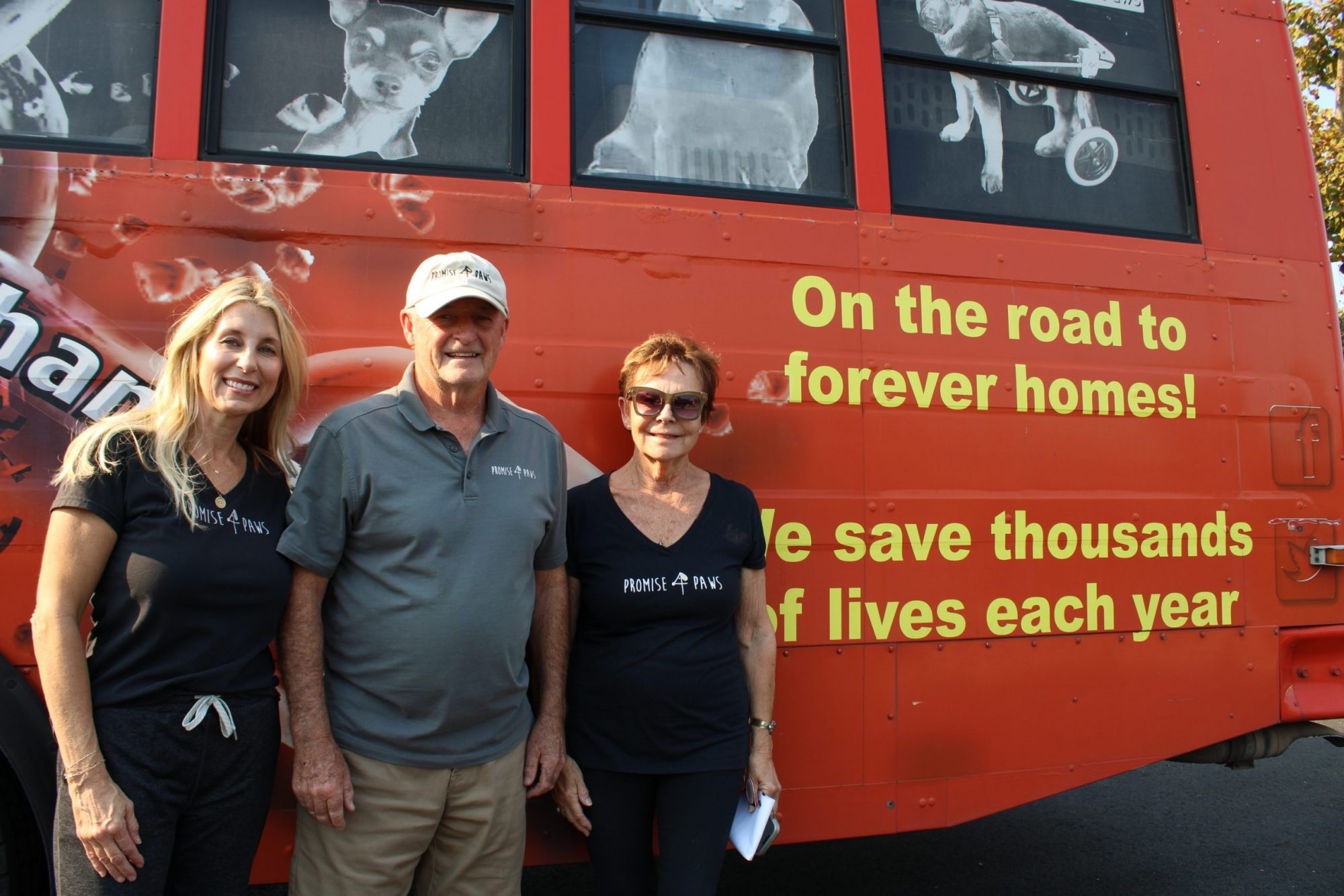
Southern California drivers on local freeways Friday morning, Nov. 3, couldn’t have missed a large red bus as it made its way up north from Orange County to Riverside and beyond.
The bus, plastered with sayings such as “Breaking the Chain of Euthanasia,” was operated by local nonprofit organization Promise4Paws, which embarked on a 22-hour ride to British Columbia where it will deliver several rescue dogs looking to enter their forever homes.
The trip is the sixth Promise4Paws has done since June, having already removed roughly 210 animals from the euthanization process at at-capacity shelters across the region.
Organization co-founder and Dana Point resident Sue Walshe said the push for beginning such rescue trips came purely from the need Promise4Paws has seen.
“We’re seven days a week, answering calls from all sorts of individuals,” Walshe said. “We open up emails in the morning and it’s requests from shelters all over Southern California, asking us—begging us— to take highly adoptable animals that they have no room for anymore.”
The problem is overpopulation, she continued, advocating that a large step towards a solution would be spay and neuter legislation. That would stop “backyard breeders” and others from making money off animals when there aren’t enough homes for each one, Walshe added.
“You can’t rescue your way out of this deplorable situation,” she said, adding, “We’re doing all we can right now, and it’s a small effort when you think (about) how many are being killed every day.”
Walshe and her husband, Kevin, founded the San Juan Capistrano-based Promise4Paws in 2018 after decades of doing other work involving animal rescue, including at the San Clemente-Dana Point Animal Shelter.
The organization takes requests from people who have to give up their pets for various reasons, whether it be a divorce, health concerns or otherwise.
According to president Michelle Cole, however, Promise4Paws got to a point where it was running out of people to send animals to, forcing the group to expand its range beyond Orange County to between San Diego and Los Angeles.
Rescue agencies in British Columbia, which doesn’t have the same overpopulation issue as Southern California and needs more small and medium dogs, reached out to a connection of Cole’s, and that connection then reached out to see if Promise4Paws could help.
Near the end of May, the organization put together a trip that would take 13 dogs on a trial basis.
“We said we’ll see how it goes, and we did that 13, and about a month later, they were like, ‘This is amazing, let’s do more,’ ” said Cole.
For the next trip, Promise4Paws brought 48 dogs, and the movement has continued since.
The participating rescues prepare all the paperwork and line up the adopting households beforehand, so that all that’s left is picking up the dogs from various shelters and starting the trip north.
Cooperation is a key part of each operation, as Cole explained.
Just days before Friday, Promise4Paws found itself in a tough situation when it couldn’t find a van to rent for the trip. On Tuesday, Oct. 31, Mike McCarthy of the Texas-based organization Rescue Express told the group it could use one of his buses, and Kevin Walshe and another organization member quickly booked a flight to Eugene, Oregon, to drive the bus back in time for Friday.
“This is rescues working together,” Kevin said. “That’s the only way it can be done.”
All the buses used have heat and air conditioning, he added, and the drivers feed the dogs before the trip instead of during to keep them from getting nauseous. The trips are also driven all the way through, which mostly is to ensure dogs don’t run away during a potential bathroom break.
Kevin said most dogs are quiet during the drive and that the rattling of the vehicles provides a calming sensation.
“They never really even bark,” he said. “It’s the funniest thing.”
Promise4Paws hopes to organize one trip per month in 2024, according to Cole, as the organization has a goal of buying a vehicle of its own and transporting between 30 and 40 dogs each time.
The feedback they get from the rescue agencies in Canada is positive, Cole added, saying the entities are “ecstatic” to get the dogs.
“It’s so rewarding to be doing this,” said Sue Walshe. “You’re just putting your finger in the dike of a humongous problem, but (for) the ones you can save, you make the dogs and the people happy.”
More information about the organization can be found at promise4paws.org.
